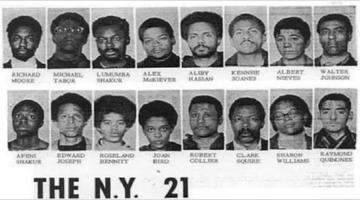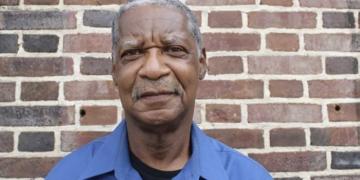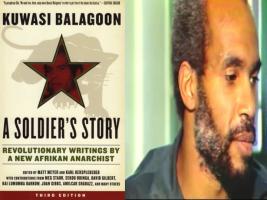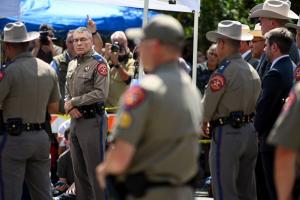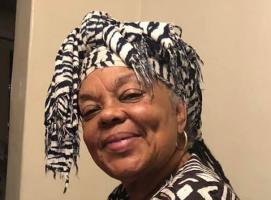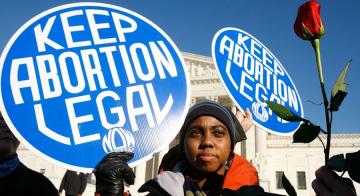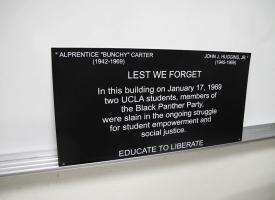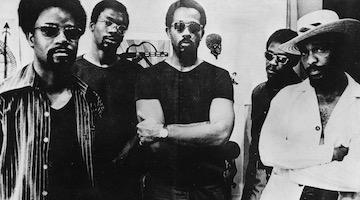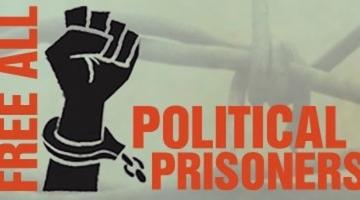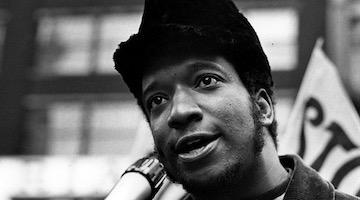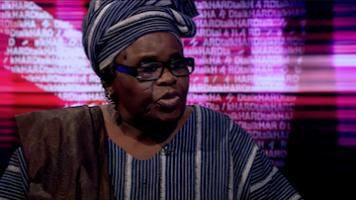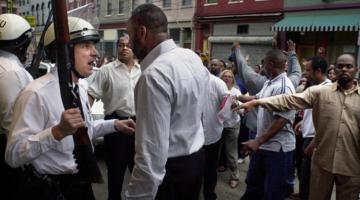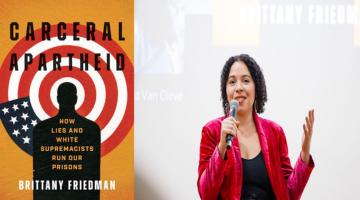How Should Revolutionaries Relate to this Film? 15 Lessons from Judas and the Black Messiah
Let’s not allow our revolutionary wish-list to keep us from appreciating the ways this film intervenes—with force and clarity—in our present American political discourse.
“The vulnerability to state coercion created by widespread criminalization creates the deadly potential for turning oppressed people against the very revolutionary organizations that aim to serve and to liberate them.”
It’s all too easy to critique a film by listing all the things it didn’t do, constructing a complaint consisting of things “left out.” And it's all too tempting for those on the left to react to “mainstream” Hollywood works through the lens of “co-optation,” ever seeking out the ideological machinations and hegemonic forces at work in a film's “symptomatic” omissions and exclusions.
It’s also too easy these days—with the aid of our simmering social media silos—to develop political expectations for mass culture that are far beyond, or even utterly out of touch with, the base-line discourse running through the broader society.
Say what you want about the selections, omissions, emphases, or ellipses of Shaka King’s Judas and the Black Messiah, but let’s not let our revolutionary wish-list keep us from appreciating a number of the ways that this film intervenes—with force and clarity—in our present American political discourse.
This is a film that deserves to be seen and engaged widely, not only as a historical primer for those previously unfamiliar with the story of Fred Hampton, the Black Panther Party, and their brutal repression at the hands of COINTELPRO, but also as a work that provides an opportunity for much-needed reflection across a wide range of ideological positions. We should be encouraging our friends, family, students, colleagues, and co-workers to see it—regardless of what we think their politics are. And we should also be creating forums for both comrades and the people to watch and discuss the film and its ideas seriously, developing our grasp, together.
As a possible contribution to such popular discussion, I’ve tried to crystallize below a number of what I see as the film’s key political “lessons” (as they come through J&BM, sometimes from Fred Hampton’s own mouth) below:
1) The FBI is not our friend. As American corporate media cozy up with the repressive state apparatus beneath the barbed umbrella of contra-Trump “resistance,” bringing many liberals with them, this film reminds us that, at root, the abiding purpose of the FBI is not to uphold justice for all, but to protect a social order that benefits only a few. While CNN and MSNBC now feature permanent pundit seats for former top officials from the CIA, NSA, or FBI, Judas reminds us of how such groups’ raison d’être has been to infiltrate, undermine, and destroy threats to the ruling class (capitalist, imperialist, white supremacist)—by any means necessary.
2) The Panthers were not “terrorists” but the target of state terror. Nothing justifies state power more than a terrorist; it’s popular revolutionaries and radical social movements that call that state power into question. Indeed, as Judas shows, much of the “worst” that was attributed to the BPP in terms of violence was in fact instigated or even deliberately perpetrated by state infiltrators themselves. And even where the Panther’s use of violence in the film is not strictly speaking a matter of immediate self-defense (and there is some of that sort), the film makes clear that such violence is still an indirect result of oppressive conditions and police state terror.
3) Cultural nationalism is not the same as revolutionary culture. The opening Hampton speech of the film—addressed to a student group at a predominantly black college—seems aimed at elements of our current moment and movements. As Hampton underscores in his critical comments, donning dashikis, renaming colleges, and blackening the public face of elite leadership, is of limited value as far as the masses are concerned. Such symbolic top-down reforms, though by no means a bad thing in themselves, won’t protect the people, and yet may play a co-opting role for more privileged strata (like college students), substituting for more revolutionary change. (As Hampton puts it later, addressing the “Southern heritage” of the white Young Patriots, when trapped in a house that’s on fire, the only “culture” that really matters is “water and escape.”)
4) Capitalist exploiters and ‘pig’ oppressors come in every shade. Just as the film makes clear that not all whites are capitalist exploiters or supporters of the police, not all capitalists or “pigs” are white. And, as the premise of the film makes clear, skin color is no guarantee of solidarity—and thinking it is can leave an organization open to destructive backstabbing. “We’re not going to fight capitalism with black capitalism,” as Hampton famously puts it—and as this film quotes him: “We’re going to fight it with socialism.” “We’re not going to fight racism with more racism…We’re going to fight it with solidarity.”
5) While Black radicals were the main target of police repression, what made the Panthers particularly “dangerous” in the view of J. Edgar Hoover and company was that the BPP grasped that poor people across race and social movement lines share common interestsin challenging and changing this oppressive system. (As Hampton points out: “rats” and “pigs” alike were running rampant in poor white Chicago neighborhoods in 1969, too. Certainly, as Hampton recognizes, the conditions faced by black slaves, white tenant farmers, and overseers ought not to be equated. But all those groups could have still had an interest in “cutting the master’s throat,” as Hampton put it—and on this point of unity genuine solidarity could be built (and people transformed in the process).
6) It takes bold leadership to cross the prevailing social lines but doing so can yield major breakthroughs. The film shows Hampton bravely crossing onto the turf of supposed antagonists, from shotgun-armed street gangs, to hillbilly nationalists flying the confederate “Stars and Bars,” and winning friends where even his own Panther comrades expect enemies. Such underlying commonalities of interest, however, may not manifest unless one first breaches the existing social silos. Indeed, the underlying commonality may appear first as opposition, since oppressed people, hardened to survive an unjust system, may look upon strangers first as possible threats. But with the proper approach—with optimism, clarity, and humor—and with a strategic focus on common concerns and shared enemies, it is possible to find allies and new comrades in unexpected places. (Even among those who may seem to uphold symbols, styles, or rhetoric anathema to radical change.)
7) Beware the lure of the gun (and of revenge). The open defiance of the police on the street surely inspired and galvanized many—and was crucial to the Panthers’ sudden rise. But the brandishing of the gun can be effectively suicidal in a situation where the distribution of arms is so lopsided. There is therefore a danger in romanticizing revolutionary violence (and martyrdom) and, furthermore, with thinking of revolutionary-socialist politics primarily through the metaphor of a “war”—a point made powerfully in the film by Hampton’s partner, Deborah Johnson, whose lyric talents allow her to recognize in her beloved comrade not only a warrior, but also a poet.
8 ) The system fears the radical unity of the broad masses, and targets those who make such unity possible. What makes a leader or organization truly “dangerous” to the establishment is not merely its racial character or its militancy—though both certainly factor—but its ability to connect with other groups around shared interests, recruit allies, and galvanize broader support for a radical (socialist and anti-imperialist) program, beyond the ranks of the most oppressed. (This can also be applied to the state targeting of Martin Luther King Jr. and Malcolm X during, especially during the final years of their lives.)
9) Revolutionaries romanticize the oppressed at our peril. Yes, as Mao put it, “where there is oppression there is resistance,” but also, where there is oppression there is: isolation, vulnerability, fear and desperation. Each of which can make oppressed people not less but more prone to manipulation by agents of the state into counter-revolutionary activity—this is where the focus on the Bill O’Neal’s “Judas” character is crucial.
10) Study is essential to the struggle. Hampton's Panthers took ideology and education seriously. The BPP were not merely a stylish armed breakfast organization, serving the people scrambled eggs on Tuesday and shotguns on Sunday. They were also teaching people—and themselves—core ideas of Marx, Lenin, Fanon, and Mao in Liberation Schools. They were working consciously at becoming socialists, internationalists, communists, and anti-imperialists, linking the US war in Vietnam to its abuse of oppressed people at home, and expressing solidarity and developing ties to regimes abroad, from Cuba to China to Algeria. (It is clear that Shaka King elected to foreground Hampton as educator—we see him more often with chalk in hand than gun. And just as Fred and Deborah study Malcolm X's speeches with care, so a new generation should now study Hampton's words, maybe even working from this film.)
11) State repression threatens not just to destroy revolutionary movement from without, but to distort it from within. Police violence can do double-damage, not only laying waste to the lives of revolutionaries, organizers, and people from oppressed communities, but also instilling in some of its victims a rage, desperation, and desire for revenge that can in turn play right into the enemies’ hands, undermining organizational discipline and collective strategy, substituting individual martyrdom for collective transformation. (The subsequent fear of state repression can in turn lead to a third form of damage, as organizational “security culture” cuts groups off from not just the state, but the people, too.)
12) Mass incarceration and repression create both political opportunities and dangers for revolutionary movement. The film foregrounds the contradictory implications: on the one hand, prisons have the potential to be a kind of “ground zero” for revolutionary activity, creating new forms of solidarity and collaboration among some of society's most oppressed. On the other, the vulnerability to state coercion created by widespread criminalization creates the deadly potential for turning oppressed people against the very revolutionary organizations that aim to serve and to liberate them. (At the same time, some of the most powerful displays of community support for the BPP came in the wake of the police fire-bombing of their headquarters.)
13) Revolutionary leadership like Hampton's is precious and has a crucial role to play, but over-reliance on it can become a movement weakness. There is no way you can watch this film and still feel unequivocally that we are somehow better off in horizontal “leaderless” organizations without the guidance of such charismatic voices. Yet the film shows Hampton’s own struggle in his last days against the tendency to elevate him at the expense of the group and its mission. As Hampton puts it, “You can kill a revolutionary…But you can’t kill Revolution.” How then can we cultivate and support revolutionary leadership without creating mass dependency upon it? (It’s crucial to recall here that the label “Black messiah” was a targeting invention of the state; we ought not to take up such a notion in our own movements.)
14) A line struggle runs through this entire society—between serving the people, even when it means breaking with the system(proletarian ideology), and defending the system or profiting oneself, even when it means hurting the people (the “pig” outlook). No one is excluded, no one immune.
15) It is the role of revolutionaries not to act in place of the people but to “sharpen the contradictions” and clarify the stakes, so that the people themselves can decide. As Hampton puts it: “Where there are people, there is power.” Yes! But how will the people grasp their power and come to wield it? What line will prevail? We need revolutionary educators of all types to help people “make the distinction,” as Chairman Fred put it, “between the proletariat and the pig.” To do so is not so simple a task as it might seem: for to separate the two is not just a matter of saying “these people are the heroes” and “those people the villains,” but of recognizing the ways in which the “proletarian v. pig” struggle is at work broadly across society, not just between but also within people’s lives and many of our institutions. “Making the distinction,” then entails working through the particularity of the contradiction, the class and ideological struggle cutting across all things in society, from the prison cell to the schoolhouse, from the workplace, to the street….to, yes, even the movie theater.
So then: Rather than asking whether or not Judas & the Black Messiah fulfilled our own personal desires for what a revolutionary film about Fred Hampton or the Black Panthers ought to look like, perhaps we should begin with another sort of question: What can we do to make the most of this opportunity? How can this film be used as a tool for advancing the struggle? How can we use this powerful (if imperfect) film as a chance to “heighten the contradictions” so that more and more people can learn the enduring lessons of this history?
Joseph G. Ramsey is writer, activist and organizer, based in Dorchester, Massachusetts. He teaches English and American Studies at the University of Massachusetts Boston, where he is an elected member of the Executive Committee of the Faculty Staff Union (FSU/MTA), a member of the Caucus for a Democratic Union (CDU), and an organizer with the Coalition to Save UMB. His writings on the university, race, class, and capitalism have appeared in The Chronicle of Higher Education, Inside Higher Ed, Jacobin Magazine, Slate, Red Wedge, Counterpunch, and Mediations, as well as the journals Cultural Logic and Socialism and Democracy, where he is on the editorial board. He can be reached at jgramsey AT gmail.com.
This article previously appeared in Counterpunch.
COMMENTS?
Please join the conversation on Black Agenda Report's Facebook page at http://facebook.com/blackagendareport
Or, you can comment by emailing us at [email protected]

